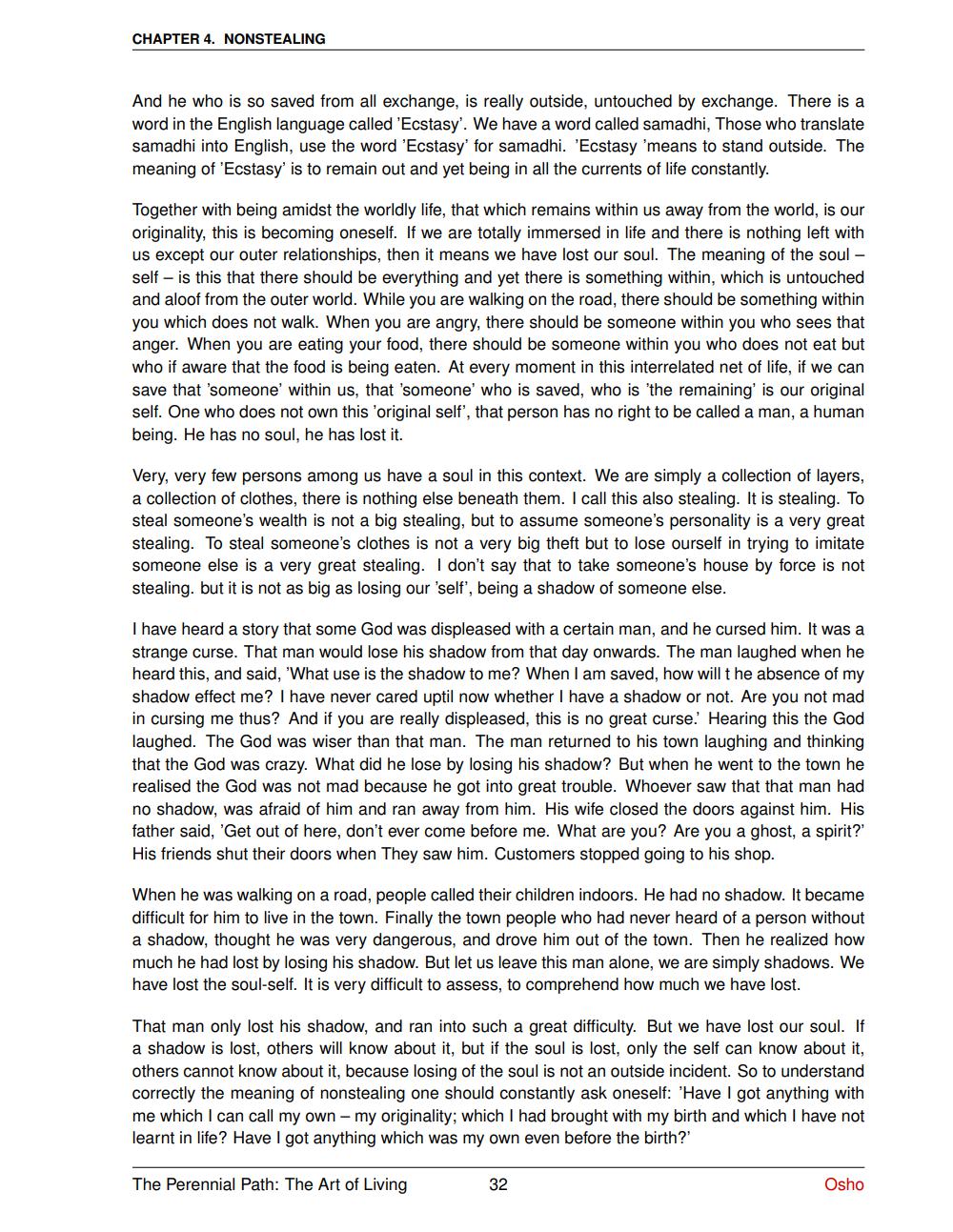________________
CHAPTER 4. NONSTEALING
And he who is so saved from all exchange, is really outside, untouched by exchange. There is a word in the English language called 'Ecstasy'. We have a word called samadhi, Those who translate samadhi into English, use the word 'Ecstasy' for samadhi. 'Ecstasy 'means to stand outside. The meaning of 'Ecstasy' is to remain out and yet being in all the currents of life constantly.
Together with being amidst the worldly life, that which remains within us away from the world, is our originality, this is becoming oneself. If we are totally immersed in life and there is nothing left with us except our outer relationships, then it means we have lost our soul. The meaning of the soul - self - is this that there should be everything and yet there is something within, which is untouched and aloof from the outer world. While you are walking on the road, there should be something within you which does not walk. When you are angry, there should be someone within you who sees that anger. When you are eating your food, there should be someone within you who does not eat but who if aware that the food is being eaten. At every moment in this interrelated net of life, if we can save that 'someone' within us, that 'someone' who is saved, who is 'the remaining' is our original self. One who does not own this 'original self', that person has no right to be called a man, a human being. He has no soul, he has lost it.
Very, very few persons among us have a soul in this context. We are simply a collection of layers, a collection of clothes, there is nothing else beneath them. I call this also stealing. It is stealing. To steal someone's wealth is not a big stealing, but to assume someone's personality is a very great stealing. To steal someone's clothes is not a very big theft but to lose ourself in trying to imitate someone else is a very great stealing. I don't say that to take someone's house by force is not stealing. but it is not as big as losing our 'self', being a shadow of someone else.
I have heard a story that some God was displeased with a certain man, and he cursed him. It was a strange curse. That man would lose his shadow from that day onwards. The man laughed when he heard this, and said, 'What use is the shadow to me? When I am saved, how will t he absence of my shadow effect me? I have never cared uptil now whether I have a shadow or not. Are you not mad in cursing me thus? And if you are really displeased, this is no great curse.' Hearing this the God laughed. The God was wiser than that man. The man returned to his town laughing and thinking that the God was crazy. What did he lose by losing his shadow? But when he went to the town he realised the God was not mad because he got into great trouble. Whoever saw that that man had no shadow, was afraid of him and ran away from him. His wife closed the doors against him. His father said, 'Get out of here, don't ever come before me. What are you? Are you a ghost, a spirit?' His friends shut their doors when They saw him. Customers stopped going to his shop.
When he was walking on a road, people called their children indoors. He had no shadow. It became difficult for him to live in the town. Finally the town people who had never heard of a person without a shadow, thought he was very dangerous, and drove him out of the town. Then he realized how much he had lost by losing his shadow. But let us leave this man alone, we are simply shadows. We have lost the soul-self. It is very difficult to assess, to comprehend how much we have lost.
That man only lost his shadow, and ran into such a great difficulty. But we have lost our soul. If a shadow is lost, others will know about it, but if the soul is lost, only the self can know about it, others cannot know about it, because losing of the soul is not an outside incident. So to understand correctly the meaning of nonstealing one should constantly ask oneself: 'Have I got anything with me which I can call my own - my originality; which I had brought with my birth and which I have not learnt in life? Have I got anything which was my own even before the birth?'
The Perennial Path: The Art of Living
32
Osho




